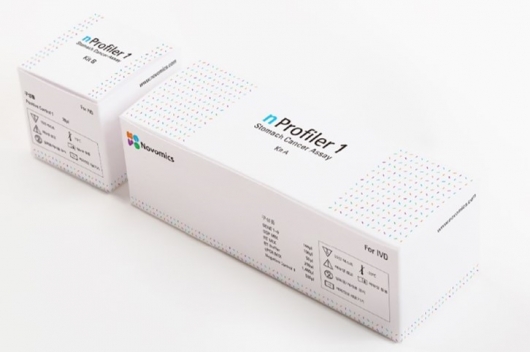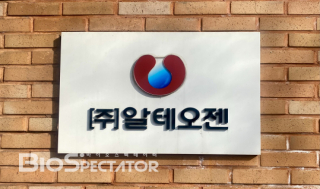기업
Novomics "The first molecular IVD kit for predicting the prognosis after stomach cancer surger"
바이오스펙테이터 Euna Lee 기자

Korea’s biopharmaceutical company Novomics said on March 22 that it has developed the molecular diagnostic kit “nProfiler1 Stomach Cancer Assay”, which is capable of predicting the prognosis after stomach cancer surgery.
The nProfiler 1 Stomach Cancer Assay is intended for use in categorizing patients into groups depending on their algorithm-based prognosis, by measuring the expression of genes in the tissue samples obtained from patients with stage II–III progressive stomach cancer.
Recently, the joint research to develop and validate a predictive test for adjuvant chemotherapy response in patients with resectable, stage II–III gastric cancer was conducted. The research report, entitled “Predictive test for chemotherapy response in resectable gastric cancer: a multi-cohort, retrospective analysis”, was published in a recent issue of The Lancet Oncology.
The development for nProfiler1 Stomach Cancer Assay was led by Prof. Noh Sung-hoon and Prof. Cheong Jae-ho from Yonsei University Severance Hospital, who were co-founders of Novomics as Chief Medical Officer. Currently, the technology has already been transferred to Novomics.
In general, gastric cancer is classified into stages I–IV from the perspective of anatomical pathology. With the results of laboratory test, patients who are in stages higher than stage II receive auxiliary chemotherapy following surgery, in accordance with the TNM clinical stage classification method. Nevertheless, the overall survival benefit observed after chemotherapy is moderate, suggesting that not all patients with resectable gastric cancer treated with chemotherapy benefit from it.
The nature of gastric cancer in individual patients is believed to vary, depending on the expression of specific genes. We are using the nProfiler1 Stomach Cancer Assay in the following manner: Novomics checks the cancer tissue in the formalin-fixed, paraffin-embedded (FFPE) format delivered from the hospital, and generates the qPCR data for the gene expression of immune subtype, stem cell-like subtype, or epithelia subtype by extracting mRNA. Based on the qPCR data, the post-operative prognosis of patients is classified into low, intermediate, or high risk, while the chemotherapy response is divided into appropriate or inappropriate treatment groups.
More specifically, the nProfiler 1 Stomach Cancer Assay is characterized by categorizing the prognosis of patients into three clusters, namely, Good, Intermediate, or Bad, by measuring the expression of 9 genes (GZMB, WARS, SFRP4, and CDX1 as major genes, and ACTB, ATP5E, HPRT1, GPX1, and UBB as reference genes), using a binary single based TWO-TIER system in the FFPE tissue samples.
Since the nProfiler1 Stomach Cancer Assay provides individualized data for post-operative prognosis and chemotherapy response, doctors may establish future treatment strategy, according to company officials.
Therefore, in this study, we aimed to develop through a multi-step strategy a predictive test that consists of two rule-based classifier algorithms, with predictive value for chemotherapy response and prognosis.
The study findings showed that the immune subtype was identified in 79 (13 %) of 625 patients. When the 79 patients were divided into the two groups (either patients receiving the surgery only, or patients undergoing both surgery and chemotherapy) to investigate their 5-year overall survival (based on full recovery), the difference between the two groups was minimal.
Thus, we obtained the following conclusions:
- For patients with immune subtype whose prognosis is good, but chemotherapy is inappropriate, unnecessary anticancer treatment should be avoided.
- For patients whose prognosis is poor, and chemotherapy is inappropriate, proper target therapy should be aggressively sought.
- For patients whose prognosis is poor, but adjuvant chemotherapy is appropriate, chemotherapy should be further considered.
The results of this study confirmed that a new opportunity may be offered to patients, since treatment options other than chemotherapy are available.
The molecular diagnostic kit used in the study is approved by the Ministry of Food and Drug Safety as a medical device classified as Grade 1 (a molecular diagnosis product that enables post-operative prediction of prognosis in patients with stage II–III). Thus, it may be applied to clinical settings without separate commercialization process, and the nation’s new health technology assessment is underway.
Meantime, the following university hospitals participated in the study: Yonsei Cancer Center, Gangnam Severance Hospital, Seoul National University Hospital, National Cancer Center, Bundang Seoul National Hospital, Chonnam National University Hwasun Hospital, and Yeungnam University Medical Center.

▲노보믹스의 위암 수술 후 예후와 항암제 적합성을 예측하는 의료기기 'nProfiler1 Stomach Cancer Assay Kit' (사진: 노보믹스 제공)





![[인사]한미그룹 2026년 정기 임원인사](https://img.etoday.co.kr/crop/74/74/2071974.jpg)








![[인사]한미그룹 2026년 정기 임원인사](https://img.etoday.co.kr/crop/77/77/2071974.jpg)


